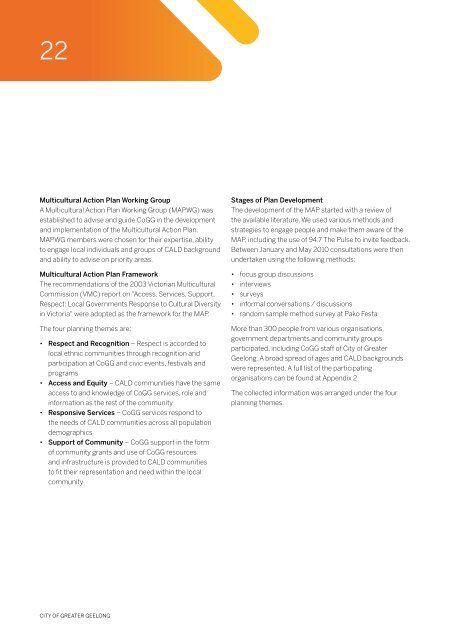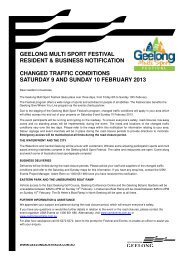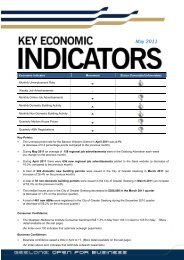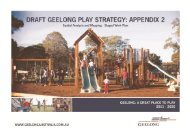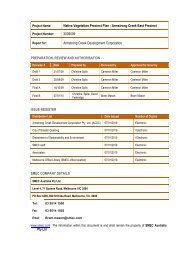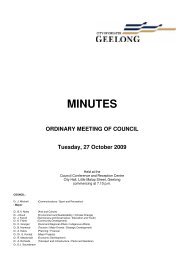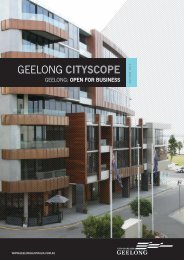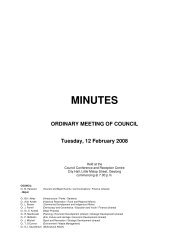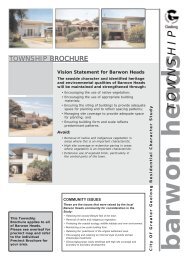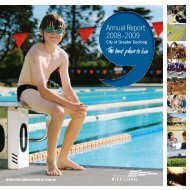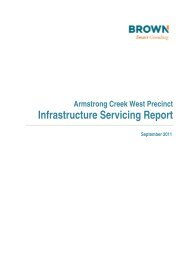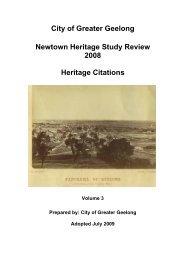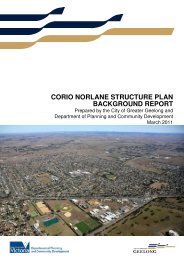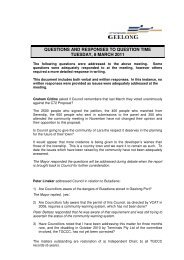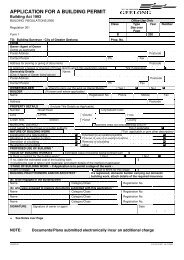Multicultural Action Plan (PDF - 2.5MB) - City of Greater Geelong
Multicultural Action Plan (PDF - 2.5MB) - City of Greater Geelong
Multicultural Action Plan (PDF - 2.5MB) - City of Greater Geelong
You also want an ePaper? Increase the reach of your titles
YUMPU automatically turns print PDFs into web optimized ePapers that Google loves.
22<br />
<strong>Multicultural</strong> <strong>Action</strong> <strong>Plan</strong> Working Group<br />
A <strong>Multicultural</strong> <strong>Action</strong> <strong>Plan</strong> Working Group (MAPWG) was<br />
established to advise and guide CoGG in the development<br />
and implementation <strong>of</strong> the <strong>Multicultural</strong> <strong>Action</strong> <strong>Plan</strong>.<br />
MAPWG members were chosen for their expertise, ability<br />
to engage local individuals and groups <strong>of</strong> CALD background<br />
and ability to advise on priority areas.<br />
<strong>Multicultural</strong> <strong>Action</strong> <strong>Plan</strong> Framework<br />
The recommendations <strong>of</strong> the 2003 Victorian <strong>Multicultural</strong><br />
Commission (VMC) report on "Access, Services, Support,<br />
Respect: Local Governments Response to Cultural Diversity<br />
in Victoria" were adopted as the framework for the MAP.<br />
The four planning themes are:<br />
• Respect and Recognition – Respect is accorded to<br />
local ethnic communities through recognition and<br />
participation at CoGG and civic events, festivals and<br />
programs<br />
• Access and Equity – CALD communities have the same<br />
access to and knowledge <strong>of</strong> CoGG services, role and<br />
information as the rest <strong>of</strong> the community<br />
• Responsive Services – CoGG services respond to<br />
the needs <strong>of</strong> CALD communities across all population<br />
demographics<br />
• Support <strong>of</strong> Community – CoGG support in the form<br />
<strong>of</strong> community grants and use <strong>of</strong> CoGG resources<br />
and infrastructure is provided to CALD communities<br />
to fit their representation and need within the local<br />
community<br />
CITy OF GREATER GEELOnG<br />
Stages <strong>of</strong> <strong>Plan</strong> Development<br />
The development <strong>of</strong> the MAP started with a review <strong>of</strong><br />
the available literature. We used various methods and<br />
strategies to engage people and make them aware <strong>of</strong> the<br />
MAP, including the use <strong>of</strong> 94.7 The Pulse to invite feedback.<br />
Between January and May 2010 consultations were then<br />
undertaken using the following methods:<br />
• focus group discussions<br />
• interviews<br />
• surveys<br />
• informal conversations / discussions<br />
• random sample method survey at Pako Festa<br />
More than 300 people from various organisations,<br />
government departments and community groups<br />
participated, including CoGG staff <strong>of</strong> <strong>City</strong> <strong>of</strong> <strong>Greater</strong><br />
<strong>Geelong</strong>. A broad spread <strong>of</strong> ages and CALD backgrounds<br />
were represented. A full list <strong>of</strong> the participating<br />
organisations can be found at Appendix 2.<br />
The collected information was arranged under the four<br />
planning themes.


